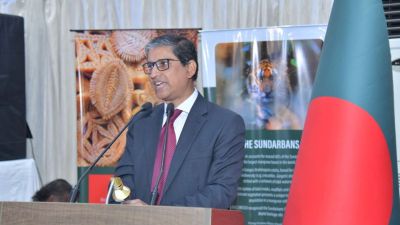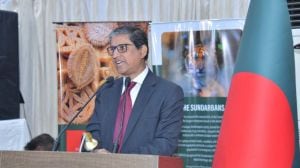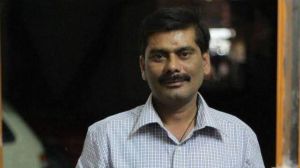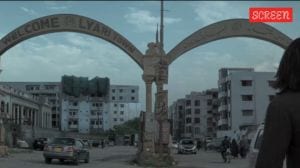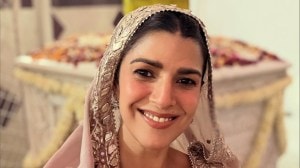Click here to follow Screen Digital on YouTube and stay updated with the latest from the world of cinema.
Paatal Lok 2’s writers on crafting a successful sequel, Ansari’s death and addressing criticism: ‘Personal is political’
Paatal Lok 2 writers Sudip Sharma, Abhishek Banerjee, Rahul Kanojia and Tamal Sen dissect the endless months spent in the writers’ room, the weight of expectations after a critically acclaimed first season, some key moments that defined the show, and their response to the critiques it has drawn.
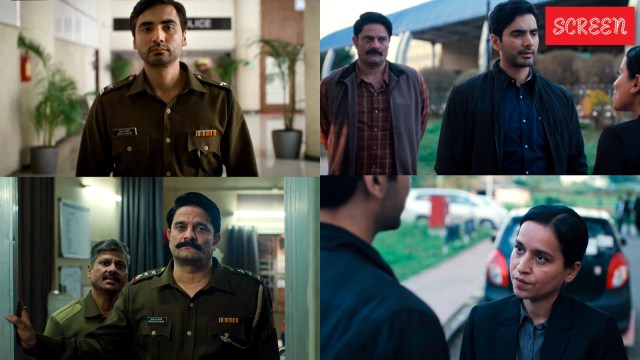 Paatal Lok 2 is streaming on Amazon Prime Video.
Paatal Lok 2 is streaming on Amazon Prime Video.Just two days after Paatal Lok Season 2 premiered, one of its screenwriters, Tamal Sen, took to Instagram with a reflective post. It was a small glimpse into the show’s writers’ room. If cinema is often hailed as a director’s medium, then a series belongs, unequivocally, to its writers. It is their playground. A space to explore characters in all their contradictions, to subvert genre conventions, and to add subtext into the very fabric of storytelling. Unlike conventional feature films, which demand brevity and structure, long-form storytelling allows for indulgence, for slow-burning arcs, for lives lived in their entirety.
Long before a series finds its way to set, it takes its first breath in the writers’ room. In his post, Sen introduced the four minds upon whose shoulders the weight of this season rested. One photo featured showrunner and the lead writer Sudip Sharma (hereafter identified as SS) lounging with a cat, as if befitting the ‘Masterji’ of this dense universe. There was Abhishek Banerjee (AB) — not to be confused with the actor behind Hathoda Tyagi, but the writer who previously penned the chilling horror-thriller Pari. Rahul Kanojia (RK) who sculpted some of this season’s most dramatic moments. And Sen himself (TS) — the man responsible for ruthlessly killing the show’s darlings.
In an exclusive, spoiler-laden conversation with SCREEN, they dissect the endless months spent in the writers’ room, the weight of expectations after a critically acclaimed first season, some key moments that defined the show, and their response to the critiques it has drawn.
Edited excerpts:
I know you’ve probably been asked this a lot, but to get the ball rolling, I want to start with the “curse of the sequel.” Sequels often struggle to recapture the magic of their predecessors. How did you approach Paatal Lok 2 to ensure it wasn’t just an extension but a compelling evolution of the story? Did the pressure of living up to Season 1’s acclaim influence your creative decisions?
SS: There were a couple of things at play. First, the new writers coming into Season 2 were starting fresh, so I don’t think they felt the weight of expectation in the same way. Also, in our case, we had already begun working on the second season before the first one even aired. The writers room was created sometime around August or September of 2019 while we were still editing Season 1. In a way, it felt like a natural continuation rather than a reaction to its success. The team had access to the edits, which helped immerse them in the world of the show. Honestly, there was no pressure. The only real conversation we had was about doing something different. Mostly, the discussions revolved around keeping the essence of the world intact without falling into the trap of rehashing familiar beats. That was the real challenge: identifying the core of the show, understanding what made it work, and deciding which elements to retain.
Also Read | Paatal Lok Season 2 uses violence as a smokescreen to expose how the personal is inherently political
TS: I wholeheartedly agree, but just to make it clear: Sudip makes it sound effortless when he says there was no pressure. But the truth is, there was no pressure because Sudip was there. I remember on day one, he said exactly what he just shared here. And when you have someone like him guiding us, helming the process, it gives you the courage, the hope, and the possibilities to really explore what a new season can be.
AB: Though Season 1 hadn’t been released yet, we had seen the edits, and we knew they had made something great. Even though they say there was no pressure, personally, I felt a lot of it. There was this immense responsibility to live up to what Sudip had just created.
RK: I remember we had a conversation about the pressure when Season 1 opened to a thunderous response. For a moment, Sudip wondered, how are we going to do it again? But that was the only time we even acknowledged it. Not even a full discussion, just a brief moment of apprehension, I suppose. Eventually, for us, it was a standalone season, a new story. So we never really had a proper chat about crafting a “successful sequel” in the writers room.
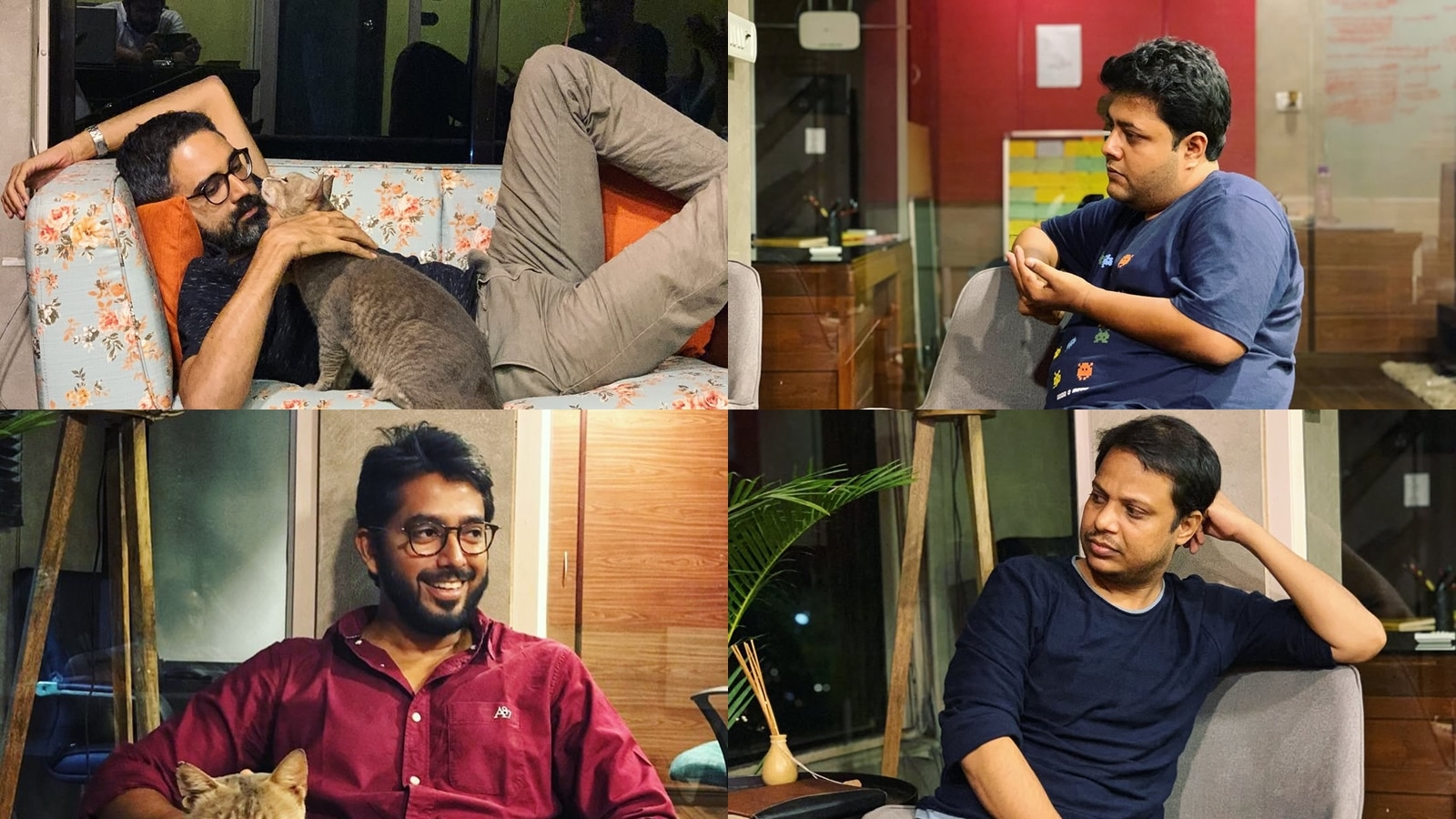 Paatal Lok Season 2 is written by Sudip Sharma, Abhishek Banerjee, Rahul Kanojia and Tamal Sen.
Paatal Lok Season 2 is written by Sudip Sharma, Abhishek Banerjee, Rahul Kanojia and Tamal Sen.
How did the writers’ room take shape for this season? How did each of you respond when Sudip reached out? And what was the functioning of the room like?
RK: Paatal Lok 2 was my first project. I had written a spec script that I had sent to Prosit Roy, who co-directed Season 1. He was kind enough to suggest my name to Sudip, who was looking for a writer for Season 2 at the time. We met, had a few discussions, and soon I was in the room.
AB: I had known Sudip long before this, as he was the creative producer for Pari, the first film I wrote. So we were already familiar with each other. He met each of us individually, and that’s how we all came on board. For the first few months, we didn’t write anything; we just discussed. Sudip had a one-line idea about taking the story to Nagaland and centering it around a Naga woman who had gone missing. He also had the idea that Hathi Ram would follow a small case, while Ansari would handle a big high-profile case, and at some point, they would collide. We started with that premise, spent months bouncing off ideas, writing beats, and eventually building the structure.
So you had notes and beat cards stuck on a wall?
AB: Yeah, we had everything laid out on a board. That really helped us stay in sync.
RK: Before writing, all of us knew exactly what was happening in each episode and the overall character arcs.
SS: The beats take the longest time. I’m someone who doesn’t like jumping straight into the screenplay, and that can really test your patience. You spend months staring at the board, moving around index cards, structuring the plot. It gets frustrating because, for the longest time, there’s nothing on paper; just ideas, plot points, and structural discussions. I remember Rahul, in particular, getting restless with this process. He was really eager to start writing. But I prefer taking my time, ensuring the beats are solid before getting into the actual writing — especially with long-form storytelling, which is so intricate. It’s even more critical for an investigative drama because you have to layer the narrative carefully. Easter eggs, clues, dead ends, you have to respect the genre for what it is. It took us a good five to six months just to finalize the detailed index cards and outline on the board.
Once that was done, we moved to step outlines. I wrote the first episode, Rahul wrote the second, Abhishek the third, Tamal the fourth, and so on. The process was that each writer would complete a version, I would read it and give it a pass, and then everyone would review each other’s step outlines. Once I gave the final pass, we moved to the screenplay stage, just as the pandemic hit.
Also Read | Paatal Lok Season 2: Of locations and characters who are wounded, neglected and yet hopeful
How were the episodes distributed among the writers?
SS: There wasn’t really any math to it. We had eight episodes and four writers, so it made sense to divide two each. I knew I’d take the first and the last episodes to set the tone and shape the structure. Beyond that, it was about playing to each writer’s strengths. I knew Abhishek enjoys writing action, so Episode 6 went to him. Rahul gravitates towards drama, and since Episode 5 was heavily dramatic, it made sense for him. Episode 2 was very rooted in Delhi, and with Rahul’s connection to the city, he was the natural choice for it. It was all intuitive, deciding who would be the best fit for what, rather than following some formula.
AB: And Tamal is the cruel guy who enjoys killing people…
SS: Yeah, so we just let him have the joy of killing people.
TS: I can’t even tell you how many gaalis I’ve received for that.
Speaking of that, what were the discussions behind the decision to kill a character like Ansari? Was this something that emerged in the early months of discussions, was it pre-decided, or did it come to you while writing the step outlines?
SS: It was something that surfaced during the initial months of discussions. I don’t clearly remember the exact moment when the idea struck us.
RK: I think it was Abhishek who came up with it.
TS: Yeah, it was him.
AB: Initially, we considered killing him in Episode 6 or even later in the series. But then we thought why not raise the stakes for Hathi Ram earlier? To push him into a tragedy unlike anything he’s grappled with before.
TS: I vaguely remember an earlier version where Ansari survived until the very end. He was taken as a prisoner or something like that.
SS: Thank God we didn’t go with that.
TS: That one just didn’t make sense, at all. It felt too neat, too convenient for a world like Paatal Lok. There are no happy endings in this universe; there’s always a cost. When Abhishek suggested it, the idea really resonated with us. Structurally too, it was a strong choice. Just before Ansari’s death, we see how jealousy has poisoned his friendship with Hathi Ram. It takes half a season to mend that, and just when it does, we take away the only true friend Hathi Ram ever had.
Season 1 was deeply political, while Season 2 feels way more personal. What prompted this shift? Was it a conscious effort to explore character-driven narratives over systemic themes, or did the story naturally evolve in that direction?
SS: In my work, I’ve always been drawn to larger socio-political themes. Though I wouldn’t even call them issues, but rather a man’s relationship with society. That has always fascinated me. So, naturally, the nature of that inquiry evolves. I think it’s becoming far more personal, perhaps because as you grow older, you get more sentimental. And, let’s be honest, it has become increasingly difficult to write overtly political stories. Maybe this shift is me being practical, or maybe I’m just convincing myself that the personal interests me more now. Moreover, when you’ve already explored something, you don’t necessarily gravitate towards it again. It no longer feels as exciting. Even when someone pitches me something overtly political, I find myself a little indecisive, often nudging them towards something more personal. Because, after all, the personal is political.
One key criticism is that Paatal Lok 2 feels less ‘rooted’ and lacks the raw urgency and rage that made Season 1 so gripping. Was this a deliberate tonal shift, or do you feel the show’s core intensity remains intact but has simply evolved?
SS: Rage that leads nowhere — you can only sustain that for so long before it starts feeling like impotence. Because at some point, it doesn’t do anything for you. Season 1 came from a place of great anger. Hathi Ram himself came from a place of anger. I don’t know if this shift is maturity, because often what we call maturity is just making peace with things we can no longer change. Hathi Ram is the anchor of the show. He is the lens through which we see this world. In Season 1, he wanted to be a force of change; he was aghast at everything happening around him and wanted people to talk about it. But now, he’s slowly making peace with the world, trying to do his bit in whatever way he can. So, there’s a natural progression in his arc, and the tonality of the show simply follows that.
Paatal Lok 2 is a dense beast. It demands patience from its viewers. Was there ever a concern that audiences might struggle to keep track of the narrative, especially in an era of dwindling attention spans?
AB: There was a fair bit of concern about it having too many characters, too many subplots, backstories, and even the language barrier. We did discuss whether people would be able to follow it, but that never stopped us from writing it. Simply because your creative choices shouldn’t be dictated by the expectations of the audience. The intention should always be to remain truthful to the story.
The decision to set a significant part of Paatal Lok 2 in Nagaland is bold and unique. What challenges did it present in terms of research, authenticity, and representation?
SS: Unfortunately, due to the pandemic, we couldn’t visit it when we had initially planned.
AB: A lot of our preliminary research came from books and YouTube.
SS: And we finally managed to visit the place in February 2021 and spent some time there. Some rewrites followed after we returned, based on the locations and also insights from our research associate from Nagaland, who helped with dialogues and vetted the script.
RK: The biggest concern was getting the casting right. We wanted the representation to be as authentic and nuanced as possible. And in a place like Nagaland, which doesn’t have a proper regional film industry, we were a bit worried. But credit goes to the casting team. Not just for finding actors, but for creating actors out of people who were engaged in entirely different professions.
Some critics feel the show relies on a ‘convenient’ storytelling device: Hathi Ram’s memory flashes which conveniently place puzzle pieces together. How do you respond to this critique? Was this always an intentional stylistic choice, or did it emerge organically during the writing process?
SS: It was a conscious choice, although it’s a style I don’t particularly like. The flashbacks aren’t for Hathi Ram; they’re for the audience. He has already solved the mystery in his mind; the flashes are just a way for the audience to follow his thought process. And trust me, if we removed them, it would be nearly impossible to track how he arrived at his conclusions. We even tried a version without them in the edit, and it left everyone confused. Given how dense the plot is, the only alternative was plain exposition. Say, like the scenes with him and Virk but that felt far less cinematic. We didn’t want to rely solely on that.
I want you to unpack the moment that everyone seems to have fallen in love with: the confrontation between Hathi Ram and Ansari about his sexual orientation in Episode 4. What were the discussions in the writers’ room behind ideating such a poignant scene?
TS: As we’ve said before, a lot of what we wrote came from organically discovering these characters. The writing of Paatal Lok is all about empathy — about stepping into someone else’s shoes. At the beginning of the season, Hathi Ram sees Ansari as someone who has everything, someone who has received his due, while he himself feels undervalued and excluded. There’s almost a quiet resentment there. But the moment he discovers this hidden part of Ansari’s life, his perception shifts. Up until then, he was looking at Ansari with a tinge of envy. But suddenly, he sees him as a fellow human being, someone carrying his own battles, fighting struggles that Hathi Ram had never even considered. That realisation hit all of us in the room, and honestly, I can’t take sole credit for it. It was a moment we all discovered together. I was just lucky to have written it.
The intent was never to turn it into a big moment but rather to let it play out as two people simply having a conversation. And it wasn’t about Hathi Ram suddenly becoming more evolved or ‘woke’; it was just about a man beginning to truly see his friend.
AB: I still remember how long we discussed this scene in the room. We spent hours just trying to understand how Hathi Ram would react. At one point, we even considered not resolving it, just leaving it hanging in the air. But Sudip knows Hathi Ram so well, and he always insisted that we needed a moment where he actually confronts Ansari about it.
Also Read | Paatal Lok 2 review: Sharp and searing, Jaideep Ahlawat-Sudip Sharma deliver one of the best shows of 2025
One major shift from Season 1 is the depth given to female characters, making them more complex and rounded this time. There’s a particularly striking moment in Episode 6 when Grace and Arslena talk about their husbands’ sins and how they are paying for them. What was the thought process behind writing that moment?
AB: The idea was to initially make it seem like, once again, this is a man’s world. But as the show progresses, the audience slowly realizes that the women, whether it’s Grace, Rose, or Arslena, are just as central to the crime and its consequences. The moment was designed to gradually reveal their individual pasts and how those experiences bind them together.
SS: The complexity came from the fact that they are fully aware of their roles in these crimes. But for them, there was never really a choice. They are conditioned to preserve the family, maintain the status quo, and that comes at a heavy emotional and psychological cost. That moment in Episode 6 was about acknowledging that burden. It was about two women recognizing their shared fate, even if they may not entirely trust each other.
Raghu Paswan’s death and the moment when the mystery is resolved completely shatters Hathi Ram. It’s fitting that the episode is titled ‘Good Samaritan.’ Take me through the idea behind that and the creative choices that shaped the entire moment.
SS: We debated between two titles in the edit —‘Good Samaritan’ and ‘A Few Good Men.’ Ultimately, we chose the former because of its biblical connotations. If Season 1 was rooted in Hindu scriptures, this season draws from Christian imagery, with elements like the baptism sequence and Christmas hymns part of the narrative. The title also fits perfectly with Raghu’s arc. His death is the lowest point for Hathi Ram, because this was his quest from the beginning. To bring a father back to his child. He could have easily handed the investigation off to someone else, but he pursued it with conviction. And yet, in the end, he discovers that Raghu didn’t die as part of some grand conspiracy; he was just an ordinary man trying to help Rose. His death was meaningless. It was born out of sheer greed and confusion. That realisation devastates Hathi Ram. It is in that moment that, as he sees Raghu’s body and the trumpet beside him, he decides he no longer wants to be part of a world this cruel.
- 01
- 02
- 03
- 04
- 05



